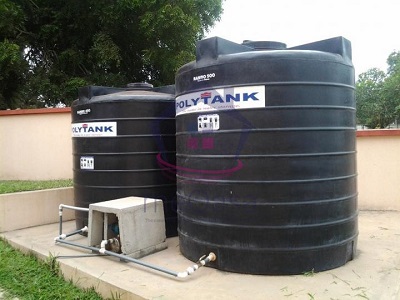Importance of water in safeguarding human security…the role of stakeholders in water storage business in Ghana

World Water Dayis here, and the world is, once again, focusing its attention on the importance of water in safeguarding human security and maintaining the health of our eco-systems.
Policy makers and experts in water, sanitation and climate change gathered at the various national, regional and global levels yesterday to observe this year’s World Water Day under the theme: “Water and Climate Change.” This year’s theme explores the relationship between water and climate change and how each affects the other in the world.
Globally, it is estimated that more than 700 million people do not have access to basic drinking water service, with majority of people in Sub-Saharan Africa mostly affected. In Ghana, statistics indicate that there is a lot of inequality in the water distribution system with some segments of the public still deprived of sustainable access to water.
According to officials of the Ghana Coalition of NGOs in Water and Sanitation (CONIWAS), people in urban areas are 98 per cent likely to have access to safe water as compared to 50 per cent of those in the Northern Region.
The Sustainable Development Goal (SDG) 6 mandates all countries to achieve universal and equitable access to safe and affordable drinking water for all its citizens. For Ghana to achieve its SDG 6, there is the need for stakeholders to help address and bridge the gap of unequal water distribution in order to ensure that Ghanaians everywhere have access to sustainable water.
Water storage can be one of the key solutions to help ensure that every Ghanaian has access to constant clean water supply. Having water in store will help to avert some socio-economic challenges that arise during water crises.
Expanding access to sustainable clean water supply
Improvement in access to potable water supply in Ghana is the cardinal principle around which stakeholders’ operations, led in the charge by Polytank Ghana, have revolved; and now committed to ensuring that clean water is brought to the doorstep of every Ghanaian irrespective of their location. This has ensured the building of a very wide, strong and timely channel of distribution over the years.
The distribution network has helped to improve access to water in both urban and rural communities in Ghana. This is because consumers do not need to travel long distances to purchase storage tanks, which can sometimes discourage them. This has also gone a long way to help reduce preventable water and sanitation-related diseases in the country.
It is estimated that, seven to eight out of 10 households have a polyethylene (poly) tank for water storage. Per the above approximation, stakeholders’ commitment to helping Ghanaians to have access to clean and sustainable water supply is being achieved on a daily basis in homes, businesses and the community at large
Protecting the Environment
These activities have a huge and lasting impact on the health of the environment. Apart from implementing good manufacturing practices that reduce energy consumption and minimize waste, players in the plastic tank or poly tank industry are also helping to prevent environmental pollution.
Plastic pollution in lakes and rivers has become a common phenomenon because of uncontrolled dumping of plastics into fresh water. In order to help reduce plastic waste in the environment, Polytank Ghana, for example, through the Mohinani Group’s Waste Management and Recycling initiative (Corporate Social Responsibility) is helping to prevent plastic littering through recycling for school children. This is a laudable initiative which should be encouraged, because children are the future and it is imperative that they get involved in shaping their own future.
It is interesting to note that, the beneficiary school children are educated to become eco heroes or ambassadors for a cleaner, healthier and greener environment. Through various environmental seminars the pupils are given orientation on waste collection and segregation by providing them with dustbins. The schools with the huge amount waste are rewarded after a period of three months.
Since its inception four years ago, more than 20,000 school pupils in the Greater Accra and Ashanti regions have participated in the programme with about 30 tonnes of recyclables (plastics and papers) collected in their various schools and communities. The sponsors have also invested more than 20,000 US dollars in the initiative.
Undoubtedly, this is a noble idea which needs to be emulated by other stakeholders in the plastic or polyethylene industry to create an environment free of plastic waste.
As the world celebrates World Water Day, it is the responsibility of all stakeholders in the water sector to double their efforts in removing obstacles that hinder access to sustainable water and its management for all Ghanaians in order to achieve the SDG 6.
There is also the need for a sustainable and customized approach that can be adopted easily and implemented by manufacturers to help protect our fresh water resources from human pollution, especially plastics.
BY MOUDLINE DOUDO




